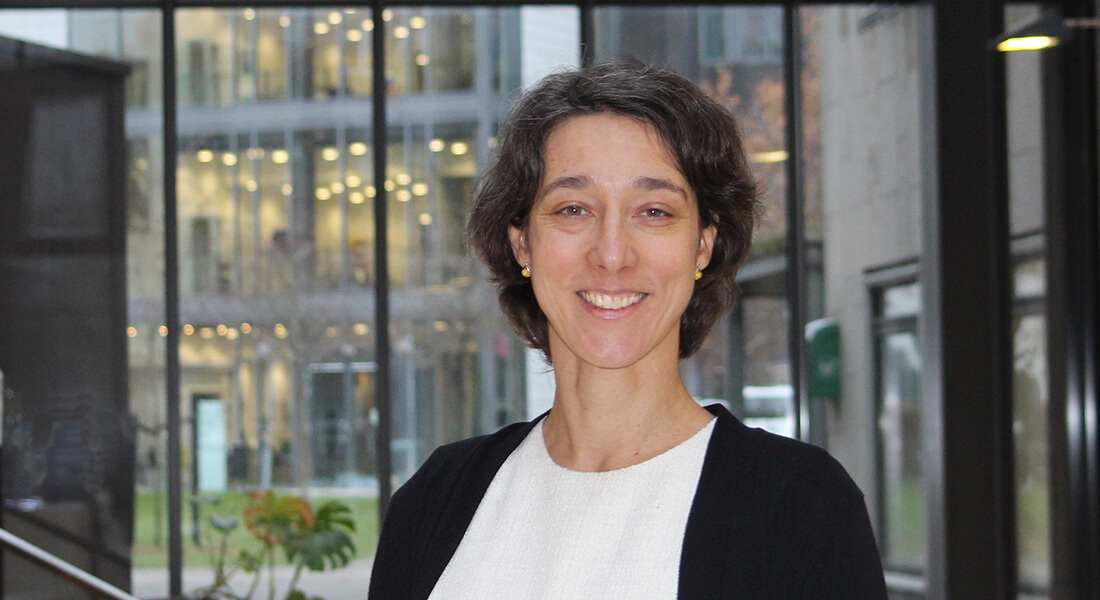Céline Galvagnion-Büll is Associate Professor in Biophysical Pharmacology
From 1 February, Céline Galvagnion-Büll will be tenured Associate Professor in Biophysical Pharmacology, based on a public job posting last fall.

She has been a researcher at ILF since 2019, where she has been conducting her research within the field of molecular and cellular biology, examining the development of neurodegenerative diseases.
Investigating the role of proteins and lipids in neurodegenerative diseases
Céline Galvagnion-Büll’s research aims at understanding the molecular events leading to the initiation and development of
neurodegenerative diseases including Parkinson’s Disease.
“These diseases are characterized by the deposition of protein clumps in the brain of patients”, she explains, “and the loss of specific neurons leading to cognitive decline and motor symptoms. Most of these neurodegenerative diseases are also associated with disruptions in lipid metabolism. My research focusses on understanding the role of these pathological lipid changes in the formation of protein clumps and neuronal cell death.”
Céline Galvagnion-Büll also relates that an expected outcome of her research is to use the identified pathological lipid changes to design lipid-based biomarkers that will allow an earlier diagnosis of the disease and therapeutics targeted at reverting identified lipid changes related to Parkinson’s Disease.
Brain lipid metabolism plays an important role in the development of Parkinson’s Disease
To gain a better understanding of the disturbances in brain lipid metabolism leading to Parkinson’s Disease, Céline Galvagnion-Büll and her group analyze brain samples and neurons from stem cells, among other approaches. As group leader of the Galvagnion group in the Molecular and Cellular section at the Department, Céline Galvagnion-Büll describes their research:
“To understand the contribution of disruptions in lipid metabolism to the initiation and development of Parkinson’s Disease pathology, we use an interdisciplinary approach combining omics and biochemical analyses of patients derived samples and biophysical characterization of protein-membrane interaction and co-aggregation.
Half of our projects involves lipidomics and biochemical analyses of post-mortem brain samples, fibroblasts, induced pluripotent stem cell derived neurons of PD patients to identify the lipid signature of the disease in various bio samples.
The other half of our projects aims at characterizing how the identified lipid changes affect the thermodynamics of protein-membrane interactions and the resulting protein-lipid co-assemblies into amyloid fibrils. These projects are run by highly skilled and dedicated students and post-docs with a range of expertise spanning from protein/lipid biophysics, biochemistry to stem cell biology.”
A researcher with a lifelong interest in education
Associate Professor Céline Galvagnion-Büll is also course coordinator of “Biochemistry and Cellular Biology”, a course that is part of the Bachelor’s programme Medicinal Chemistry, and is part of the VIP team behind “Cellular and Molecular Biology”, a mandatory course in the Bachelor’s programme Pharmacy.
On the subject of teaching and education, Céline Galvagnion-Büll says:
“I have been fascinated by teaching and the associated pedagogic approaches for as long as I can remember. Teaching and education have continuously been part of my training as an academic since my Master studies.
I believe that research and teaching are tightly intertwined, and that generating new knowledge goes hand in hand with transmitting it to the next generation, be it through lectures, class hours, lab exercises or research stays in our group. My pedagogic approach relies on combining high quality teaching and expectations with continuously developing pedagogic tools to trigger students learning, to train their scientific reasoning while providing them a safe place to thrive.”
